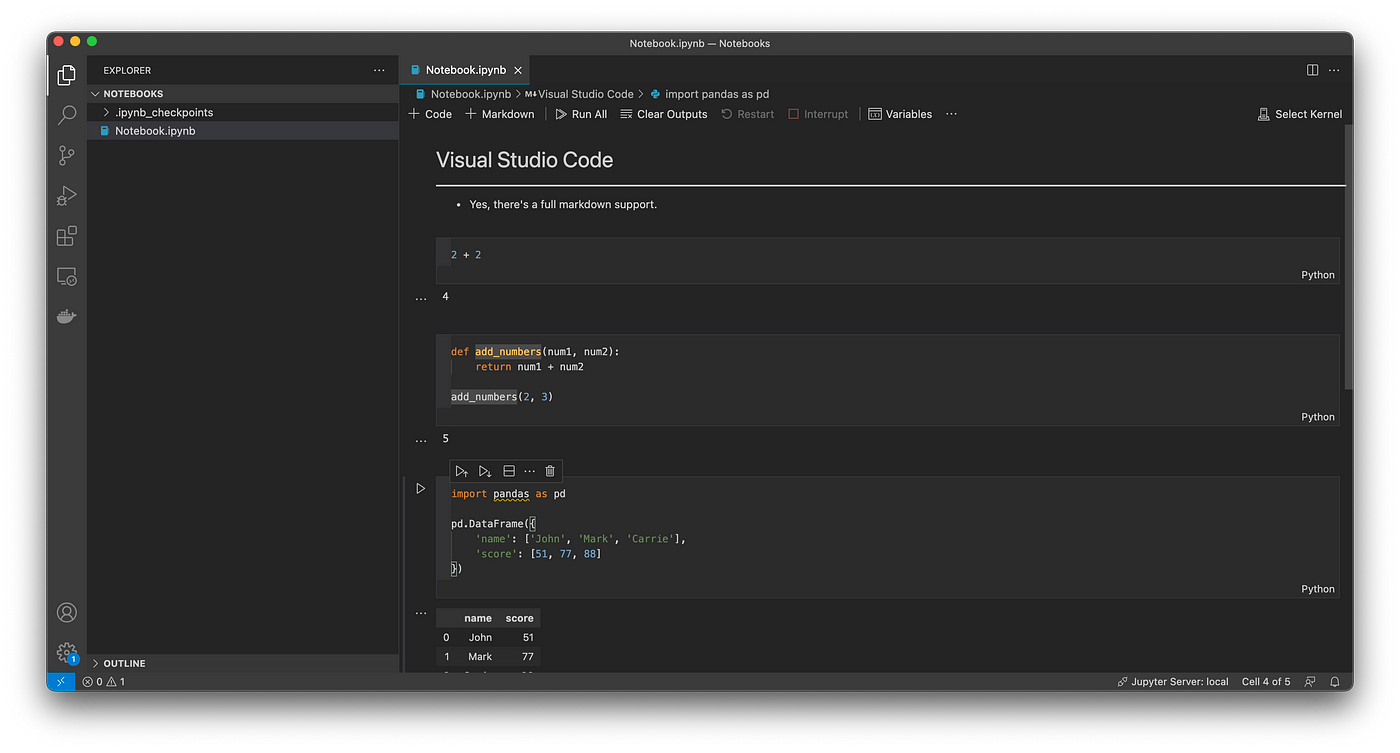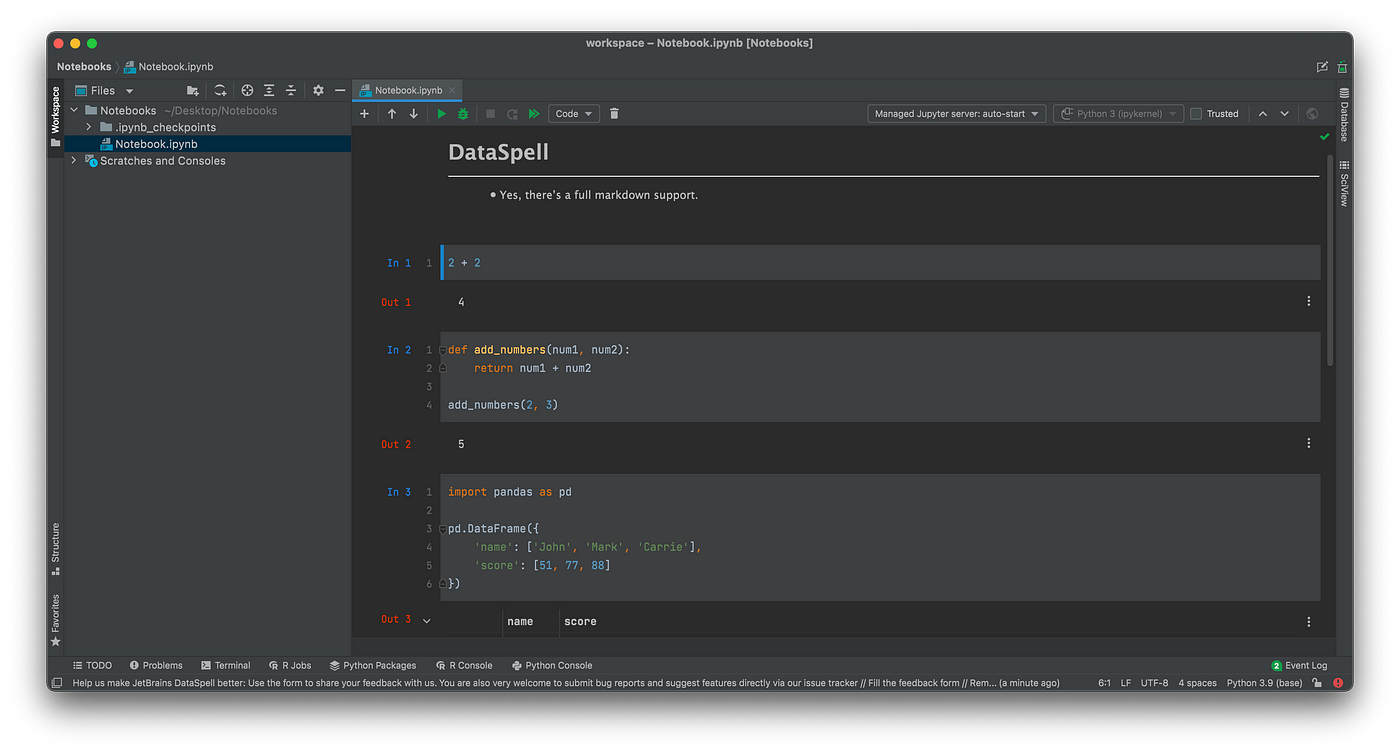Which Python Version To Use For Data Science
Superlative 4 Python and Data Science IDEs for 2021 and Across
Features vs. simplicity — here are the top picks for everyday data science workflows

The world of data science IDEs can be overwhelming. You can become from plain text editors for ultimate simplicity to IDEs so characteristic-rich they volition make your head spin. Assay paralysis gets even worse if you're willing to pay for a piece of coding software.
Y'all want something unproblematic, yet capable. You want something professional and feature-rich, yet non overwhelming. Does it ring a bell? It likely won't exist a one-time determination.
The brusque answer is — in that location's no 1-size-fits-all solution. Information technology's a personal preference. I have mine, but I'll try to stay unbiased as possible while comparison these four.
JupyterLab
Aye — it's the most popular IDE among data scientists. Jupyter Notebooks made interactivity a thing, and Jupyter Lab took the user feel to the side by side level. It'southward a minimalistic IDE that does the essentials out of the box and provides options and hacks for more advanced utilize.

JupyterLab makes information technology like shooting fish in a barrel to create rich notebooks with code and explanations. I don't know about you, only I'm non a big fan of chunky and unreadable code blocks. Jupyter allows you lot to write Markdown to explicate your idea process. This ways you can add images, URLs, and pretty much anything you can imagine.
If the Markdown isn't enough for yous, guess what? You can besides write HTML and CSS. These allow you to mode the notebooks like a website — with obvious constraints.
The IDE is and then powerful you tin can install kernels for other programming languages — such as Java, C++, or Scala. Y'all tin can besides install tons of extensions to either style or add functionality.
Pros : Free, easily installable, tons of installable plugins, minimalistic interface, has cloud alternatives for collaboration.
Cons : Terrible coding aid, tab-autocomplete is tiresome, editing .py files is a nightmare.
Visual Studio Code
Exercise you desire the best costless all-rounder? Cull this one. Visual Studio Code is equally versatile equally they come.
Want to write notebooks? Check.
Edit Python files? Duh.
Configure a Docker container? Of course.
Connect to a remote server? Certain.
Version control with Git? Got you covered.

Information technology's basically a text editor developed by Microsoft, but information technology does more than than your average text editor. You lot can install a plugin for annihilation. Coding assistance works like a charm. Overall, it's an easy to recommend product.
Y'all tin can withal do everything y'all can with JupyterLab, plus other things. Those include editing Python (or whatever programming language) files, using the built-in Terminal to manage environments and run files, style the editor with ane of the gazillion themes, and much more.
The ability to open and edit .ipynb files is somewhat new, and wasn't working the best at the start. Luckily, that's changed.
You won't go wrong with this one. Best of all, information technology's entirely free.
Pros : Free, lightweight, easy to manage the entire information science project lifecycle, highly customizable.
Cons : Can sometimes feel a chip sluggish.
PyCharm
Having a bullet-proof solution like VSCode is wonderful, only sometimes you desire a specialized solution. PyCharm is an IDE built exclusively for Python. As you would imagine, this means it is the most feature-rich.

PyCharm gives you lot a more professional feel. It isn't easy to depict, but y'all'll empathise what I'm talking almost after a couple of minutes of usage. The coding assist is superb, the debugger works like a charm, and the environment management is every bit like shooting fish in a barrel equally it gets.
That being said, one major drawback is the lack of features in the free version. The biggest missing feature is the one to edit .ipynb files, something essential in data scientific discipline workflows. This feature is bachelor simply in the pro version, which will set you lot dorsum effectually $90 per twelvemonth.
I'd say it's the best overall option for Python developers, non information scientists. I employ information technology mainly when transferring code from notebooks to Python files.
Pros : Feels professional person, amazing coding assist, easy to manage Python versions and environments.
Cons : Free version lacks support for .ipynb files. Editing HTML and CSS files is also a struggle, so keep that in mind if you're working with Flask a lot.
DataSpell
This one is a new kid on the block. It's an IDE made exclusively for information scientists. It's notwithstanding in a preview version as of September 2021, just you can sign upwardly for it here.

Information technology's developed by the same visitor as PyCharm, and so information technology will experience and look familiar to JetBrains fans. The IDE is packed with essential data science features, such every bit notebooks, Markdown, interactive beat, and SQL support.
You lot tin read my full overview here:
The notebook experience is fantastic, just it comes with an even bigger gotcha and so PyCharm. Information technology likely won't offering a free version. You can employ information technology at present while in preview way, but who knows what will happen in one case the total release is out.
Pros : Ultra-specific for data science, notebook integration is marvelous, easily connects to whatever database.
Cons : Likely won't be available for complimentary — no customs version similar with PyCharm.
What's your favorite IDE for data science? Let me know in the comments below.
Loved the article? Get a Medium member to continue learning without limits. I'll receive a portion of your membership fee if you use the following link, with no actress cost to you.
Which Python Version To Use For Data Science,
Source: https://towardsdatascience.com/top-4-python-and-data-science-ides-for-2021-and-beyond-3bbcb7b9bc44
Posted by: gloverfign1969.blogspot.com


0 Response to "Which Python Version To Use For Data Science"
Post a Comment